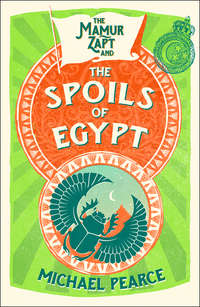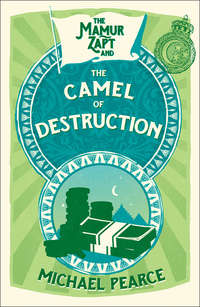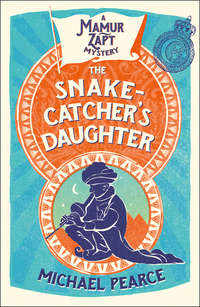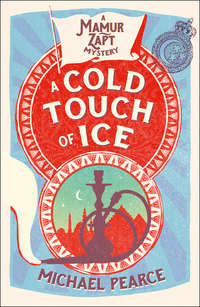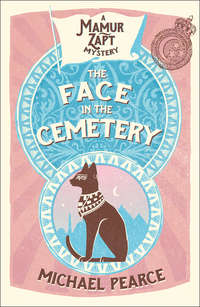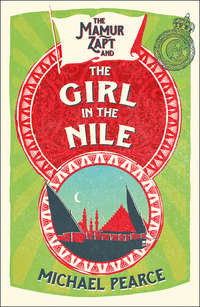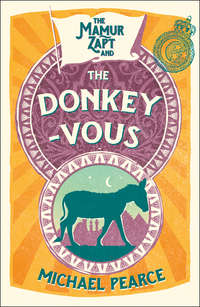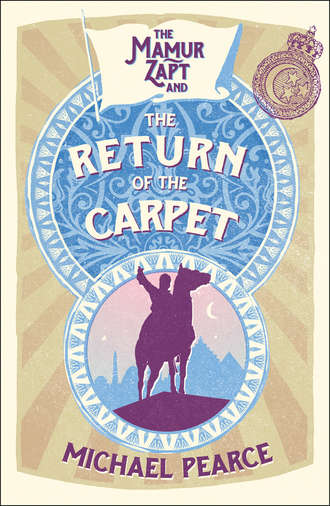
Полная версия
Mamur Zapt and the Return of the Carpet
‘He feared he was losing his strength in the bed?’
‘Yes,’ said the woman.
Mahmoud looked across at Owen.
Owen knew what he was thinking. In villages of this sort bilharzia was rife. Among the symptoms of the disease in males was a kind of overall sensual lassitude which the fellahin often took for loss of sexual potency.
‘Your husband has the worm?’
‘Yes.’
It was common for fellahin to take hashish to counter the lassitude. Ironically, it aggravated the very condition they feared.
In the room behind a small child began to cry. It was hushed by the grandmother but then began to cry again more determinedly. Another joined it.
The woman stirred.
Mahmoud put up his hand.
‘One question more: in this last week your husband has come upon a great supply of the drug. Where did he get it from?’
‘I do not know,’ said the woman.
‘Have strangers been to the village?’
‘No,’ said the omda.
Mahmoud ignored him.
‘Has a stranger been to your house?’
‘No.’
‘Has your husband talked to strangers?’
‘I do not know.’
‘Has he spoken to you of the drug?’
‘He never speaks to me of the drug,’ said the woman bitterly.
Mahmoud sat back and regarded the woman for a moment or two without speaking. Then he suddenly leaned forward.
‘Listen to me,’ he said to the woman, speaking slowly and emphatically. ‘I believe your husband to be a foolish man and not a bad one. He is a tool in the hands of others. I promise you I will try to see that his punishment fits foolishness and not badness. But I need to know whose are the hands that hold the tool. Think about it. Think long and hard.’
He turned to the omda.
‘And you,’ he said, ‘think, too. Think doubly long and hard. Or else you will find yourself in trouble.’
A servant showed them through the house and out into the garden, where Nuri Pasha was waiting for them.
He was sitting in the shade of a large eucalyptus tree, a gold-topped cane between his knees and a rug about his shoulders. His head was resting on the back of the chair and from a distance it looked as if he was asleep, but as they drew nearer Owen saw that the apparently closed eyes were watching them carefully.
‘Monsieur le Parquet! And—’ the watchful eyes lingered a little on Owen—‘le Mamur Zapt!’
Servants brought up wickerwork chairs.
‘I was,’ said Nuri Pasha, ‘about to have a late tea. Would you care to join me? Or something stronger perhaps?’
‘Thank you,’ said Owen. ‘Tea would be very welcome.’
He did not know how strict a Muslim Mahmoud was.
Nuri, it was clear, was a very Europeanized Egyptian. He spoke English perfectly, though with a suggestion that he would rather be speaking French. He was dressed in a dark jacket and light, pin-striped trousers. His shirt was impeccably white and he wore a grey silk tie fastened with a large gold pin.
‘Tea, then.’
Already, across the lawn servants were bringing a table and tea-things. The table was spread with an immaculate white cloth. The tea-pot was silver, the cups of bone china. One of the servants poured the tea and then retired into the background.
‘Good,’ said Nuri, sipping his tea.
He put the cup back in the saucer.
‘And now, what can I do for you two gentlemen?’
‘If it would not distress you,’ said Mahmoud, ‘I would like to hear your account of what happened in the Place de l’Opéra.’
‘Of course, dear boy,’ said Nuri. ‘I am only too glad to be able to assist the Parquet. Especially,’ he smiled, ‘in the circumstances.’
He seemed, however, to be in no hurry to begin. His eyes wandered across the flowerbeds to the other side of the lawn.
‘Beautiful!’ he whispered.
Owen thought at first that he was referring to the freesia or the stocks, or perhaps to the bougainvillaea in bloom along the wall which surrounded the garden, but as he followed the direction of Nuri’s gaze he saw that the Pasha was looking at a young peasant girl who was walking along a raised path just beyond the wall with a tall jar on her head.
‘Beautiful,’ breathed Nuri again.
‘If I was younger,’ he said regretfully, ‘I’d send someone to fetch her. Those girls, when they are washed, are very good in bed. They regard an orgasm as a visitation from Allah. When I was young—’
He went into graphic detail.
The story came to an end and Nuri sat for a moment sunk in the memory of past pleasures.
Owen stretched out a hand towards the cucumber sandwiches. The shadow of a kite hawk fell on the table and he looked up hurriedly, but the hawk was wheeling far above. He helped himself to the sandwich. Sometimes, at the Sporting Club, the hawks would snatch the food out of your very hand.
Mahmoud ventured a little cough.
‘The Place de l’Opéra,’ he murmured.
Nuri affected a start.
‘I am so sorry,’ he said. ‘Monsieur le Parquet does right to recall us to our business.’ He looked at Mahmoud with a glint of amusement in his eyes. ‘I hope my reminiscences did not bore you?’
‘Oh no,’ protested Mahmoud. ‘Not at all.’
‘Ah? Well, in that case perhaps you would like to hear about the peasant girl on one of my estates. She—’
He stopped with a grin.
‘Or perhaps not. You are busy men. And it is not every day that one receives a visit from the Mamur Zapt.’
‘I shall enjoy reading your memoirs,’ said Owen.
‘I am afraid,’ said Nuri, with real regret, ‘that the best bits have to be left out. Even in Egypt.’
‘The Place de l’Opéra,’ murmured Mahmoud doggedly.
‘The Place de l’Opéra,’ said Nuri. ‘Just so.’
Even then he shot off at a tangent.
‘The case,’ he said. ‘How is it going?’
‘All right,’ said Mahmoud, caught off guard. ‘We are making progress.’
‘Ah? What have you found out?’
‘We are only at the beginning,’ said Mahmoud reluctantly.
‘Nothing, then?’
‘We are holding a man.’
‘The fellah?’
‘Yes.’
Nuri waved a dismissive hand.
‘A tool,’ he said.
Mahmoud rallied determinedly.
‘A number of points have emerged from my inquiries,’ he said, ‘some of which are interesting and which I would like to check. Against your account.’
‘Oh?’ said Nuri. ‘What interesting points?’
‘That, I shall not be altogether certain of until I have heard your account,’ said Mahmoud blandly.
Nuri threw up his hands with a laugh.
‘You have beaten me!’ he conceded. It was evidently his way to play games.
He signalled to one of the servants, who came up and rearranged the rug round the old man’s shoulders.
‘I will tell you what happened,’ said Nuri, ‘although I am afraid it will be a very sketchy account.’
‘Even that may help,’ said Mahmoud.’
‘Yes,’ said Nuri sceptically. ‘It may.’
He leaned back in the chair and closed his eyes.
‘I had been meeting colleagues—former colleagues, I should say—in the Hotel Continental. When the meeting was over I went to find my arabeah. It was not there, so I went out into the Place to look for it. Suddenly—’ his eyes opened—‘I saw a man in front of me raising a gun.’
‘How close?’
‘From me to you. Perhaps a little more.’
Mahmoud waited for Nuri to think back.
‘And then?’
Nuri frowned.
‘And then I don’t know what happened.’
‘Were you conscious of the gun going off?’
‘I heard a shot. Yes, I certainly heard a shot. And I fell down. Though whether before or after or at the same time I really cannot remember. Everything is very hazy.’
‘You may have dazed yourself in falling,’ said Mahmoud.
‘The doctor thinks so,’ said Nuri. ‘He claims to detect a bruise on the back of my head. I must say, I am not conscious of it myself, but then, my livelihood does not depend on finding bumps on other people.’
‘You did see the man with the gun, though. Could you describe him?’
‘Not very well. I saw him only fleetingly.’
‘Was he dressed in European clothes?’
Nuri looked at him. ‘I have heard the accounts of my would-be assassin,’ he said drily, ‘and you yourself confirmed that he was a fellah.’
Mahmoud apologized.
‘I was merely trying to prompt you to recall exactly what you saw,’ he said. ‘Was he young or old, for instance, what kind of galabeah was he wearing?’
‘I do not,’ said Nuri Pasha, ‘bother to distinguish one fellah from another.’
There was a little silence.
‘In any case,’ said Nuri, ‘the fellah is not the one that matters. He is merely a tool.’
‘Have you any idea,’ asked Owen, ‘who might be using him as a tool?’
‘I am afraid not.’
‘Can you think of anyone who would wish to kill you?’
Nuri looked at Owen with surprise.
‘Mon cher,’ he said. ‘Everybody wants to kill me. Tout le monde.’
‘Come,’ said Owen, ‘you have enemies enough, I am sure, anyone in your position is bound to, but there is a difference between having an enemy and having an enemy who wants to kill you.’
‘You are right,’ said Nuri Pasha, ‘if a trifle literal. I am plainly guilty of exaggeration. Let me try to be more accurate. Only half the population of Egypt wants to kill me. The other half would just be happy to see it happen.’ He laughed, and then put his hand on Owen’s arm. ‘I joke, mon cher,’ he said, ‘but it is no joke really.’
Owen nodded.
The word ‘Denshawai’ did not need to be spoken.
Nuri’s eyes wandered away again across the garden. The girl had gone, however.
‘The fellah who tried to shoot you,’ said Mahmoud, ‘had a personal grudge against you.’
‘Oh yes,’ said Nuri.
‘It appears you took a liking to his wife’s sister—a peasant girl, like the one we saw. Only on that occasion you did send for her.’
‘Really?’ said Nuri, without much interest. ‘If so, she would have been well paid.’
‘It is just that it gives a motive,’ said Mahmoud, ‘sufficient in itself. We do not necessarily have to look for an ulterior one. The affair, that is,’ he ended carefully, ‘may be merely a private one.’
‘Since when,’ asked Nuri, ‘has the Mamur Zapt been interested in affairs which are merely private?’
‘Have you received any threatening letters?’ asked Owen.
Nuri made a gesture of dismissal.
‘Mon cher!’ he said, almost reproachfully. ‘Dozens!’
‘Recently? In the last two weeks?’
‘I expect so,’ said Nuri. ‘It is not the part of my mail to which I give the greatest attention.’
He looked at Owen.
‘You would not expect a killer to give warning, surely?’
‘It happens surprisingly often,’ said Owen.
Nuri laughed. ‘I expect it is the weakness for rhetoric characteristic of those engaged in politics,’ he said.
He glanced at Mahmoud.
‘Especially Egyptian politics.’
‘Not just Egyptian,’ said Owen. ‘However, there is a different explanation. The terrorist clubs tend to contact their targets first. Especially,’ he added, looking directly at Nuri, ‘when they are trying to extort money.’
Nuri shook his head.
‘If they had asked for money I would probably have paid.’
‘You have received a communication, then?’
‘I was speaking generally.’
Nuri leaned back in his chair and called to one of his servants. The man disappeared into the house.
‘You must speak to Ahmed,’ he said. ‘He deals with my mail.’
A sulky young Egyptian came out of the house. He seemed to walk across the lawn deliberately slowly, placed himself directly in front of Nuri, with his back to Owen and Mahmoud, and said:
‘Yes?’
‘Mon cher,’ said Nuri reproachfully. ‘We have guests.’
The young man deigned to throw them a glance.
‘Interesting guests,’ said Nuri. ‘Le Parquet et le Mamur Zapt.’
The glance the young man threw now was one of undisguised hostility.
Nuri sighed.
‘Our guests were asking if I have received any threatening letters recently?’
‘You always receive threatening letters,’ said the young man harshly. ‘Deservedly.’
‘I would like to see,’ said Owen, ‘any that have been received in the last three weeks.’
The young man looked at Nuri.
‘Please!’ said Nuri. ‘If you have not already consigned them to the wastepaper basket as they deserve.’
‘Very well,’ said the young man, ‘if you wish.’
He went off into the house.
Nuri regarded him fondly.
‘My son,’ he said, ‘by a slave girl. He hates me.’
Ahmed returned with a sheaf of papers which he gave to Nuri, who in turn passed them to Owen.
They were very much as Owen had expected: abusive letters from individuals, either badly written or in the ornate script of the bazaar letter-writer; scurrilous attacks by obscure radical organizations, darkly hinting that Nuri would get his deserts; savage denunciations by extremist religious groups, threatening retribution; and the expected extortionary letters from the new political ‘Clubs’ which had sprung up in such profusion in the last couple of years.
There were four letters in this last category and Owen found no ‘Club’ names among them that he did not recognize. This should make it comparatively easy to check them out.
He passed the sheaf on to Mahmoud.
‘I’d like to keep them for a bit, if I may,’ he said.
‘Of course.’
‘Can I go?’ asked Ahmed.
Nuri looked at Owen.
‘Unless the Mamur Zapt wishes for something else?’ he said.
Owen shook his head. The young man turned away immediately.
Nuri sighed.
The interview came to an end soon after and a servant showed them out.
They went into the house through a large, cool room, all marble and tiles, in which several people were sitting with drinks in their hands.
Among them was Ahmed. As Owen and Mahmoud entered, he ostentatiously turned his back. The woman beside him looked up at Owen with amusement. Owen caught a glimpse of a strong, beaky face and dark hair.
The other guests treated them with polite indifference. They were for the most part elderly, wealthy, Europeanized. In the upper levels of Cairene society it was fairly usual for women to be present and for alcohol to be served; but, Owen reflected, had any of the fundamentalist groups which had written to Nuri been watching, it would have added fuel to their denunciations.
He and Mahmoud walked back to the main street to find an arabeah. By mutual consent they walked slowly. In this wealthy suburb of Cairo the bougainvillaea spilled over the walls and the pepper trees and eucalyptus hung out across the road making it cool and shady. From the green recesses of the trees came a continuous purring and gurgling of doves.
‘A clear-cut case,’ said Mahmoud. ‘Circumstantial evidence, motive, confession.’
‘Believe it?’
‘Not for one moment,’ said Mahmoud.
CHAPTER 3
Owen could not give all his time to the Nuri Pasha affair. He had his ordinary work to do.
This morning it was the demonstration. One of his men had picked the rumour up in el Azhar, Cairo’s great Islamic university. It was supposed to be taking place that afternoon once the sun had moved off the streets. Intelligently, the man was staying in the university so that he could keep an eye on developments. His reports came every hour. It looked as if the thing was definitely on.
According to his most recent information, the demonstration would take place in Abdin Square, in front of the Khedive’s Palace. The students intended to march there in procession from the university. They would make their way in separate groups through the narrow mediaeval streets which surrounded el Azhar and assemble in the wider Bab Zouweleh, before the Mouayad Mosque. Then they would march along the Sharia Taht er Rebaa, cross the Place Bab el Khalk, and proceed past the Ecole Khediviale de Droit, at which point they would join the law students. From there it was a short step to Abdin Square.
‘Mounted?’ asked Nikos.
Nikos was the Mamur Zapt’s Official Secretary; a sharp young Copt.
Owen nodded.
‘With foot in reserve to mop up. I’ve already spoken to McPhee.’
‘I’ll check,’ said Nikos, rolling up the street plan.
‘And, just in case,’ said Owen, ‘I want both entrances to Abdin Square sealed off.’
‘Both?’
‘The two on the eastern side. The Gami’a Abdin as well as the Bab el Khalk.’
‘It shouldn’t be necessary,’ said Nikos.
‘I know. But I don’t want to risk any of them getting into Abdin Square.’
Nikos inclined his head to show that he had understood. He reached across the desk, took some papers from the out-tray and stuffed them under his arm along with the street map.
‘It means more men,’ he said. ‘Wouldn’t a small mounted troop in the Square do instead?’
‘No. It would look bad.’
Nikos raised dark eyebrows. ‘That worries you?’
‘A bit,’ Owen conceded.
‘The Khedive is hardly going to complain.’
‘He might,’ said Owen. ‘Just to be difficult.’
Nikos made a dismissive gesture. He had a Cairene contempt for the powerless.
From along the corridor came the chink of cups and a strong aroma of coffee.
‘It’s not that, though,’ said Owen. ‘It’s the way it might come across in the papers. The international ones, I mean.’
Especially now, he thought, with the new Liberal Government in England feeling extremely sensitive about international opinion after the Denshawai business and trying to get out. He wondered how much Nikos knew. Enough, he suspected. Nikos wasn’t stupid.
Nor, in fact, was the Khedive. He was adept at finding pretexts to cause diplomatic trouble. There were plenty ready to help him. France for one, which had never forgiven the British for the way they had stayed on after crushing the Arabi rebellion. Turkey for another. After all, Egypt was still in theory a province of the Ottoman Empire, with a Head of State, the Khedive, who owed allegiance to the Sultan at Istanbul.
In theory. In practice, the British ran it, and Egypt’s real ruler, for over thirty years now, had been the British Agent; first Cromer and now Gorst. The Khedive appointed his Ministers and they were responsible to him through the Prime Minister and Cabinet for their management of the Departments of State. But at the top of each great Ministry Cromer had put one of his men. They did not direct, they advised; but they expected their advice to be taken, and if it was not, well, there was always the Army: the British Army, not the Egyptian.
And then, of course, there was the Mamur Zapt.
That was the reality. But it did not mean that appearances could be dispensed with. Egypt was still in principle a sovereign state, the Khedive still an independent sovereign. The British presence needed explaining.
The British story was that they were there by invitation and on a temporary basis. They would withdraw once Egypt’s finances were sorted out. Only they had been there for thirty years now.
His Majesty’s Government thought it best, in the circumstances, to emphasize that the British role in Egypt was purely an advisory one. The British Agent merely suggested, never instructed; the ‘advisers’ made ‘recommendations,’ not decisions; and the Army was kept off-stage. Appearances were important.
And so it would not do for the students to demonstrate outside the Palace. It would give all sorts of wrong impressions.
Nikos, of course, understood all this perfectly well. Indeed, like many sophisticated Cairenes, he rather enjoyed the ambiguities of the situation. Not all Egyptians, naturally, had such a developed taste for irony.
Curiously, the British themselves were not entirely at home with the position either. It was too complicated for the military and, even under Cromer’s strong hand, there was always tension between the civil administration, conscious of the diplomatic need to preserve appearances, and the army, impatient to cut through the web of subtleties, evasions and unstated limitations.
The Mamur Zapt inhabited the shadow between the two.
‘Keep McPhee informed,’ he told Nikos. ‘I’m going out later.’
He had an appointment with Mahmoud.
As Nikos left he nearly collided in the doorway with Yussuf, who spun the tray away just in time. Clicking his tongue at the departing Nikos, he slid the tray on to Owen’s desk.
‘The Bimbashi has a visitor,’ he announced. Yussuf was a great purveyor of news. ‘He told me to bring the cups.’
Like McPhee, Owen had his own service-issue mug, which Yussuf now half-filled with coffee. When they had visitors a proper set of cups was produced.
‘Oh,’ said Owen, and then, pretending interest so as not to hurt Yussuf’s feelings. ‘Who is he?’
‘From the Palace, I think,’ said Yussuf, gratified. ‘The Bimbashi looked unhappy.’
McPhee always found relations with the Khedive’s staff very difficult. On the one hand he had great respect for royalty, even foreign royalty; on the other, he knew that not all the Khedive’s requests were to be met. Some were acceptable to the British Agent, others were not, and McPhee lacked the political sense to know which was which. The adroit politicians of the Khedive’s personal staff ran rings round him, forever laying traps which he was forever falling into.
Owen was responsible through Garvin directly to the British Agent and had little to do with the Khediviate, something for which he was very grateful.
On this occasion, however, he was unable to keep out. Shortly after he had heard Yussuf’s slippers slapping away down the corridor, he heard them slap-slapping back. Yussuf appeared in the doorway.
‘The Bimbashi would like you to join him,’ he recited.
He saw that Owen had not finished his coffee.
‘I bring you a cup,’ he said.
The man from the Khedive was a Turk in his late fifties, with close-cropped hair and a grey, humourless face.
‘Guzman Bey,’ said McPhee.
He introduced Owen as the Mamur Zapt. The other barely nodded. Owen returned the greeting as indifferently as it was given.
McPhee sat stiff and uncomfortable.
‘It’s about Nuri Pasha,’ he said to Owen. ‘The Khedive is very concerned.’
‘Naturally,’ said Owen.
‘He would like to know what progress has been made.’
‘It’s very early days yet,’ said Owen, ‘but I believe the Parquet have the matter well in hand.’
‘What progress?’ said the man harshly.
‘A man is held. He has confessed.’
Guzman made a gesture of dismissal.
‘The others?’ he said.
‘The Parquet has onlyjust begun its investigations,’ Owen pointed out.
‘The Parquet!’ said the man impatiently. ‘And you? The Mamur Zapt?’
‘The case is primarily the concern of the Parquet,’ said Owen. ‘I am interested only in security aspects.’
‘Precisely. That is what interests the Khedive.’
‘I am following the case,’ said Owen.
‘No progress has been made?’
‘As I said—’ Owen began.
The man cut him short. ‘The British are responsible for security,’ he said to McPhee. ‘What sort of security is this when a statesman like Nuri Pasha is gunned down in the street?’
‘He was not gunned down,’ said Owen.
‘Thanks to Allah,’ said the man. ‘Not to you.’
Owen was not going to be provoked.
‘The Khedive has many valued friends and allies,’ he said evenly. ‘It is not easy to protect them all.’
‘Why should they need protection?’ said the Turk. ‘That is the question you have to ask.’
‘That is the question the Khedive has to ask,’ said Owen, counter-attacking.
The man gave a short bark of a laugh.
‘If he is not popular,’ he said, ‘then it is because he shares the unpopularity of the British.’


